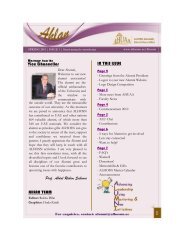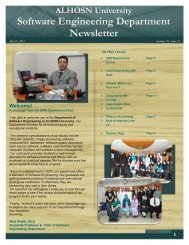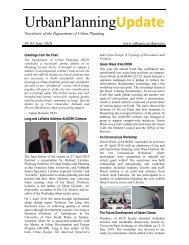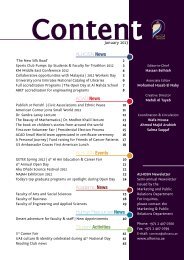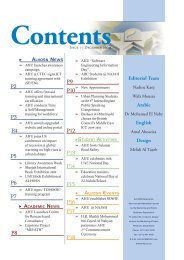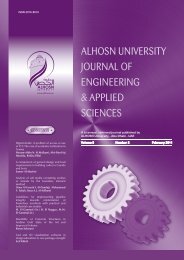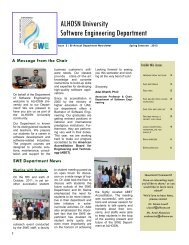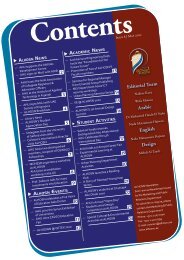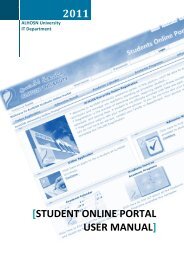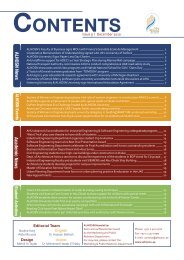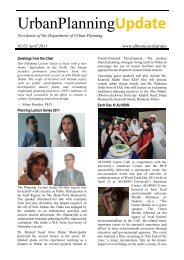ALHOSN University Catalogue Global Knowledge with Local Vision ...
ALHOSN University Catalogue Global Knowledge with Local Vision ...
ALHOSN University Catalogue Global Knowledge with Local Vision ...
Create successful ePaper yourself
Turn your PDF publications into a flip-book with our unique Google optimized e-Paper software.
contributor and sometimes in a leadership role [ABET (d)]<br />
PO-E: an ability to identify, formulate and solve engineering problems [ABET (e)]<br />
PO-F: an understanding of professional and ethical responsibility [ABET (f)]<br />
PO-G: an ability to communicate effectively <strong>with</strong> a wide range of audiences <strong>with</strong> written, oral and<br />
visual means <strong>with</strong>in the context of mechanical engineering practice [ABET (g)]<br />
PO-H: the broad education necessary to understand the impact of engineering solutions in a<br />
global, economic, environmental, and societal context [ABET (h)]<br />
PO-I: a recognition of the need for, and an ability to engage in life-long learning [ABET (i)]<br />
PO-J: a knowledge of contemporary issues and an awareness of current best practices in<br />
mechanical engineering and a recognition of the need and an ability to engage in<br />
entrepreneurial activities [ABET (j, f, h, k)]<br />
PO-K: an ability to use the techniques, skills, and modern engineering tools necessary for<br />
engineering practice [ABET (k)]<br />
Overall perhaps the greatest single reason for studying mechanical engineering is that students<br />
become well prepared for employment in a very wide range of exciting industries including aerospace,<br />
automotive, chemical industry, computers, electronics, fossil and nuclear power, manufacturing,<br />
pharmaceuticals, robotics, and textiles.<br />
Mechanical engineers find employment in eight broad classifications <strong>with</strong>in the field: research,<br />
development, design, testing and evaluation, production and manufacturing, operation and maintenance,<br />
marketing and sales, and administration. The breadth of the mechanical engineering program also<br />
provides for greater mobility for career shifts later in life.<br />
Program Outlook<br />
The mechanical engineering curriculum is a four-year program (133 credit hours course work plus a<br />
compulsory internship/industrial training of two credit hours) leading to a Bachelor of Science<br />
Mechanical Engineering; many courses have a hands-on laboratory component.<br />
This undergraduate program combines a broad-based education in the engineering sciences (mechanics,<br />
materials, fluid and thermal sciences, systems, and control) <strong>with</strong> a strong grounding in quantitative,<br />
problem-solving, design, and communications skills. By emphasizing both analytical and creative<br />
methods, the program intends to give students the broad skills set they need to pursue their goals;<br />
whether that means working as engineers, founding a company, or continuing on to graduate studies<br />
and research.<br />
Many courses throughout the curriculum incorporate design projects into the classroom experience.<br />
After their junior year, students participate in a summer internship program that requires them to work in<br />
an engineering environment for no less than four weeks (full-time) or equivalent. Before graduation, all<br />
students complete a yearlong (2 terms) senior design project plus an internship.<br />
The mechanical engineering is built to help students develop independence, creative talent, and<br />
leadership, as well as the capability for continuing professional growth.<br />
Following is a broad outlook of the 4-year program:<br />
Year 1: Students will be exposed to general education of university requirement courses in order for<br />
them to develop the aptitude for higher education. Specifically, they will be involved in calculus I and<br />
II, engineering chemistry, waves, optics and modern physics, engineering design and drawing,<br />
communication skills, scientific and technical writing, history of science, human rights in law and<br />
shari’ah and an exploratory engineering course; i.e. laboratory in engineering fundamentals.<br />
Year 2: Students will be engaged in a number of mathematics, physics, mechanics, and engineering<br />
courses. In particular, they will be involved in differential equations and linear algebra, calculus III,<br />
statistics, electromagnetism, electric circuits and devices, statics and dynamics, mechanics of materials,<br />
materials science, as well as engineering thermodynamics I, programming, and introduction to<br />
economics or introduction to entrepreneurship.<br />
Year 3: Students will begin to specialize in mechanical engineering. They will be exposed to the<br />
114



